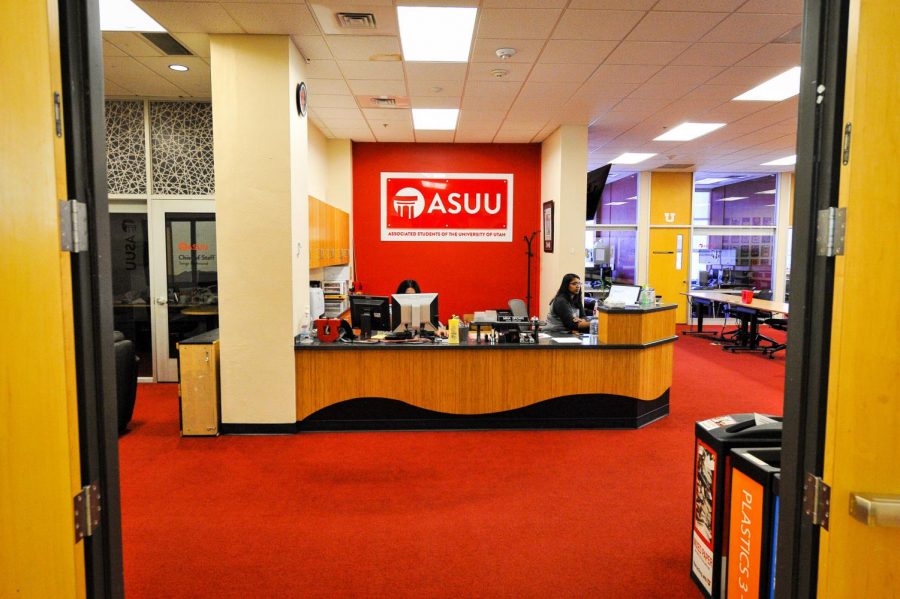The Ins and Outs of Student Government at the U
Laura Seymour and Mina Brown at the welcome desk at the ASUU offices in the Ray A. Olpin Student Union on the University of Utah Campus, Salt Lake City, UT on Thursday, July 13, 2017. (Photo by Adam Fondren | The Daily Utah Chronicle)
January 7, 2022
A Closer Look at ASUU and Its Processes
ASUU is the student government at the University of Utah and technically every student enrolled at the U is a part of it. The ASUU government has three branches: executive, legislative and judicial.
The executive branch includes the Presidency: the student body president, vice president of university relations, vice president of student relations, the chief of staff, as well as the directors of 11 different boards.
The judicial branch includes the attorney general and the supreme court, composed of seven court justices. It is the responsibility of the ASUU’s judicial branch to hold the other two branches accountable to the constitution and bylaws of ASUU, known as the Redbook. The attorney general is elected campus-wide, while the court justices are nominated by the president and approved by the senate.
The legislative branch is made up of two chambers: the senate and the assembly. The number of senators representing each college at the U is equal, while the number of representatives elected to the assembly is reflective of the number of students enrolled in the college.
Muskan Walia is a second-year student at the U studying math and philosophy. She is the senator for the College of Science, as well as the senate treasurer.
Walia said a big part of her job as a senator is determining how best to appropriate funds based on the needs of students in the college. In order to gauge these needs, interaction with the student body and the student councils representing the college are essential.
“Each senator has a student council … and that’s kind of our gateway into understanding student needs within our respective colleges,” Walia said. “We are granted funding that we work with throughout the year with our college student council to try to figure out the needs of the college and how we can appropriately spend that money to make sure that it’s being used for student needs and alleviating any burdens that there might be.”
Walia said student councils are a way that students can directly voice their ideas and concerns to the senator representing their college.
Individual senators decide how to organize their student council. Walia says in the College of Science, everyone is welcome to join, but there are also leadership opportunities for those who want a more solidified role.
She recommends that students interested in joining their college’s student council go to Campus Connect for their respective college and find out what the specific process is, it does not involve a formal election process. They can also reach out to their college’s senator, whose emails can be found in the senate directory.
Walia says as a senator, it is also her responsibility to gauge the opinion of her constituents when it comes to voting for campus-wide initiatives.
“I also get to go to the academic senate meetings, which is comprised of a lot of faculty and that’s where a lot of like the really, really big campus-wide decisions are made,” Walia said. “So I also make sure that I’m talking to constituents, that is, College of Science students, and kind of understanding their take on specific bills that may be presented in the academic senate or the student senate, just to make sure that my vote is reflective of the College of Science and their opinions.”
Walia said she became interested in running for senator after experience with student advocacy in high school, and exposure to ASUU through First Year Council. When she saw that the College of Science was lacking a voice in the senate due to an unfilled position, she decided to apply.
From the other half of the legislature, Isabel Cossa is a second-year student in the vocal performance program and assembly representative for the College of Fine Arts. She says most of her work in the legislative assembly involves securing funding for student groups on campus.
“The legislative assembly works with student groups to get them funding for projects and things like food for events, guest speakers, things like that,” Cossa said. “So we help them write bills and then submit them to the assembly so that they can receive a reimbursement for those things for their club.”
The process for getting such a bill passed begins with student groups submitting a form online, getting assigned to a representative and engaging in a meeting with the representative.
“We talk about the purpose of the bill and try to think of any questions that the rest of the assembly representatives might have during the meeting where we’re debating all the bills … before that, the finance committee goes over them just to make sure they’re following the guidelines of the Redbook … then the final process is the legislative meeting where we have debate and questions on the bill and then either pass it or not pass it,” Cossa said.
Cossa has helped a variety of student groups, ranging from a music and medicine group to Crimson Gaming.
“[Crimson Gaming has] this annual big event each year, they rented a whole movie theater, it’s this huge thing,” Cossa said. “So that was really cool to hear about and help them get reimbursed for that.”
Cossa was also led to her position after being part of the First Year Council as a freshman and hearing about the position from another member. She did not have the typical experience of running a campaign, as she applied for a spot that was open after the main campaign and was inducted after an application and interview process.
Walia ran for the senate in an unconventional year where the process was entirely online, but said it was still a fun and exciting process.
During her time as a senator, one project Walia has seen from start to end is a project to increase printer accessibility on campus.
“I noticed as I was talking to other people on campus that printing things on campus was really really difficult and getting really pricey for students,” she said. “So I started thinking about it in like September of when I entered the campus, and really, like put together a team … We started brainstorming and figuring out a way to make it happen, and that was through a joint resolution.”
The joint resolution passed through the senate but encountered logistical hurdles with funding. Walia and her team continued to work on these issues throughout the summer, and the resolution has since been passed through both legislative bodies, providing a sum of money that will allow people to get free printing on campus. Walia says the project should be put into action by next semester.
Another project Walia is working on, which is in its earlier stages, is providing free menstruation products on campus.
“I’m working with committees on campus and stakeholders on campus to make that happen. We [ASUU] are in a really special position where [we] have access to funds to pursue these initiatives that could make student life a little bit easier,” Walia said.
How To Get Involved With ASUU
To run for office, the first step is filing on the ASUU website, which Walia says is a very quick process that requires very basic information including name, email address and the position someone wants to run for.
Before filing, one needs to be declared in a major affiliated with the college they want to represent. Walia said a great way to research the expectations of the position someone is interested in is to talk to people currently in those positions.
After filing, potential candidates are added to a Canvas page with training and quizzes to help them understand their obligations and responsibilities if they were to win.
Walia said candidates have support from ASUU the whole way and are given flexibility in how they want to use their budget to produce campaign materials.
“You have people from marketing … depending on what you’re running for, you’re given a budget where you can decide how you want to use that,” Walia said. “So you could get like lawn signs or like little posters. You get an opportunity to get a headshot done, you write down your bio that will be presented on the ballots. Then typically you would table … you just kind of put your signs up, talk to students, amplify your platform.”
In terms of voting, students get ballots based on their college, which look different to include their specific choices for senator and assembly representatives. Voting is open for a week, typically in February, and Walia said students access their ballots during this time by going into the student homepage on CIS and clicking the ASUU tab.
In terms of advice for students who want to run for senate or other positions in ASUU, Walia said to go for it and be genuine.
“Be very authentic and genuine and understand why you want to run,” Walia said. “Your number one reason should be that you want to help the student body … and advocate for your peers. There’s so many different ways to be involved … you can run for attorney general or run for a student senator or assembly rep or on the presidential ticket, but they can also get involved in the different boards that ASUU has … the diversity board, the sustainability board, the finance board … I promise you that there is going to be even more than one place that needs you and needs your voice.”
Cossa recommends following the ASUU Instagram page for “opportunities like open seats, events that are going on, and scholarships on campus,” and also reaching out to people currently holding positions for more information.
“Talk to a representative … just shoot them an email, say, ‘Hey, can you tell me a little bit about your position?’ I’m sure they would be more than willing to tell you,” Cossa said.
Current open positions in ASUU can be found online. A directory of current members and information on the roles of each branch and specific positions can be found at the ASUU website and are outlined in the Redbook.








